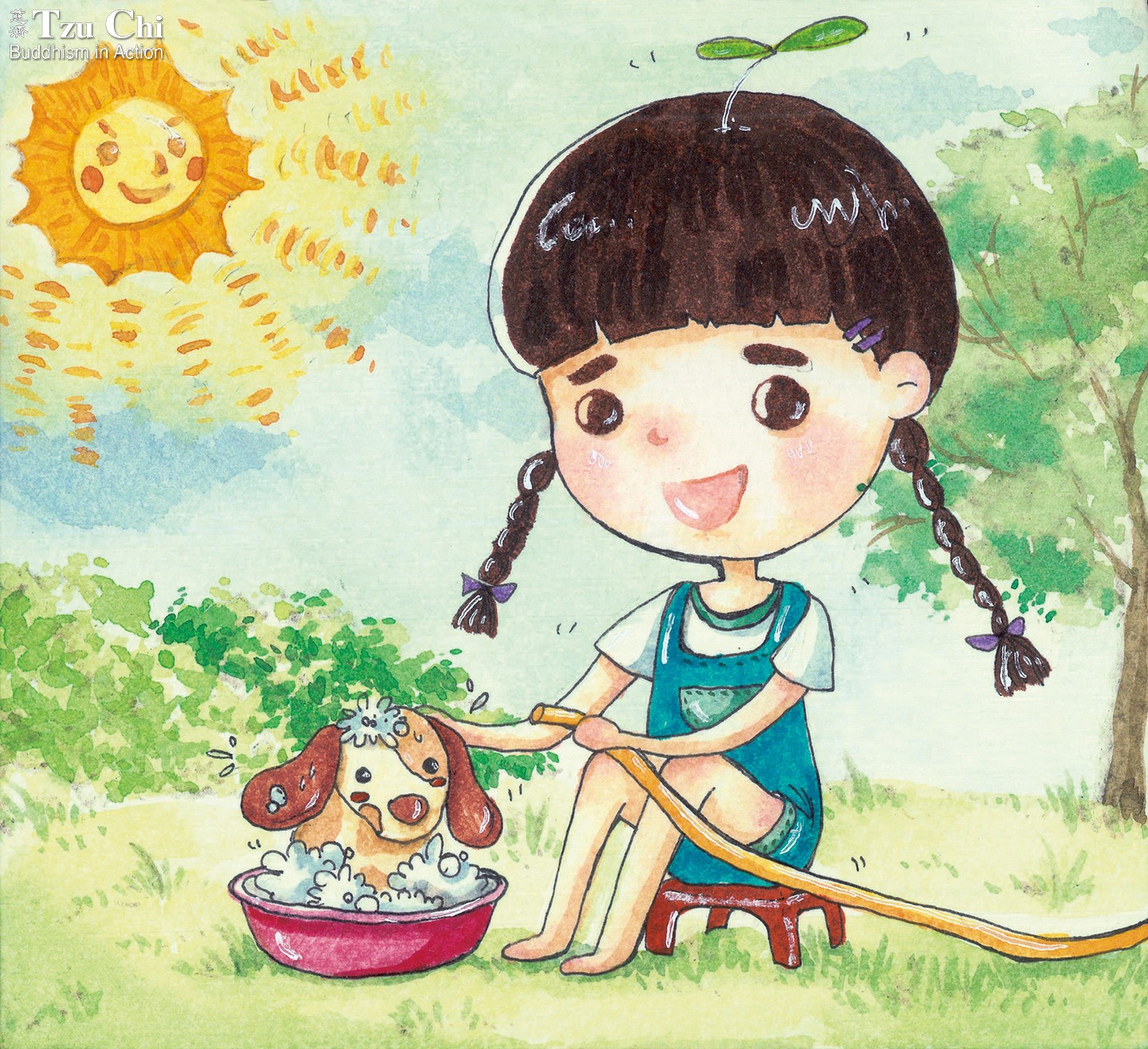By Li Qiu-yue, Tzu Chi Teachers Association
Translated by Wu Hsiao-ting
Graphic by Zhong Ting-jia

When your kids beg for a pet, how can you help them realize that they will be taking on the care and responsibility of a living thing?
Many people, including me, dream of having a pet. Who can resist a furry little kitten or a cute cuddly rabbit? A pet can also be a great source of company and comfort, especially when one is lonely or experiencing difficulties in life.
Whenever I see a dog or cat on TV nestling against their owners, I can’t help but exclaim, “I wish I had a pet, too!” When this happens, my husband steps in to play the devil’s advocate. He’ll say to me things like: “Okay, if you get one, will you have time to feed it, clean up after it, walk it every day, get it shots, cut its toenails, take it to a vet when it’s sick, and so on?” His questions are like a bucket of cold water thrown on me, instantly cooling my enthusiasm and sobering me up.
When your kids want a pet, make sure they understand the realities of having a pet, in the same way my husband does for me. Let your children know that once they own a pet, they will have to be responsible for it—because every life needs respect. When young ones learn about the responsibilities that come with keeping a pet, they may try to bargain with you to get things in their favor, but don’t back down. If you do, you are paving the way for them to ignore their duties for the pet, and you’ll very likely end up being the major caretaker for the animal once the initial novelty has worn off. It’s therefore important to reach some kind of understanding with your kids before allowing a pet into your life. It may even be necessary to establish some consequences with your children in the event they don’t live up to their commitment to take care of the pet. They need to understand the importance of taking care of another living thing.
Many parents eventually give in and get a pet for their children because they can’t resist the youngsters’ constant begging or withstand their looks of pleading. But if you don’t establish important ground rules and expectations with your children ahead of time, they will play with the animal but leave the responsibility of caring for it to others. What’s worse, their love for the animal might cool as the novelty of having a pet fades. What could have been a great opportunity for them to develop a sense of responsibility and respect for a real-life animal is lost.
Laughter and tears
A good friend of mine and her two children love dogs and they once had one of their own as a pet. The children would take the dog out for walks, clean up after it, and tag along when it was taken to a beauty salon to be bathed and groomed. When the dog fell ill, they took turns with their parents caring for it and would accompany it to the animal hospital. They even prayed for it when it became seriously ill. When the dog eventually passed away, the family purchased a niche in a columbarium for its ashes. They still go to the columbarium often to “visit the dog.”
Everyone in the family—parents and children—actively cared for the dog throughout its life and afterwards. They were all involved and had built an unbreakable bond with the animal.
My two children once kept silkworms for projects required by their natural science classes. I taught them how to wash mulberry leaves and wipe them dry to feed their worms. I also taught them to clean up the worms’ houses. We observed them as they made cocoons, metamorphosed into moths, laid eggs, and eventually passed on one by one. When a worm died, I asked my kids to wrap its body in tissue paper, bury it in a flowerpot, and say a proper goodbye to it.
My children kept a turtle and some fish too. The first thing they did when they returned home from school was hurry over to their pets to say hello and talk to them. After a while, however, their pets started to get sick. My kids were extremely worried, and discussed with their classmates how to better care for the animals. They washed the fish tank with more care and took their turtle out into the sun once a week. Even so, their best efforts proved futile. The time to say goodbye eventually came as the pets passed away. My children were very sad, and they never asked to keep a pet after that.
Adopt instead of buying
If, after discussion, you and your children still decide to get a pet, I suggest that you take their ages into consideration. If your kids are younger, consider getting pets that are less demanding of time and attention, such as fish or turtles. Pets such as cats and dogs are more appropriate when your kids are older and better able to provide care for the animals. Also, consider adopting rather than buying a pet—you will be giving a stray animal a warm and loving home.
Another good idea is for you and your kids to volunteer at an animal shelter before taking on a pet. The animals will benefit from the love you show them, and you will receive hands-on experience in learning how to care for animals. It will help you decide whether or not you will be a suitable pet owner, and it will help your kids learn the meaning and value of respecting life.



